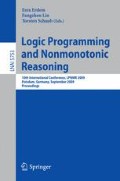Abstract
We develop a module-based framework for constraint modeling where it is possible to combine different constraint modeling languages and exploit their strengths in a flexible way. In the framework a constraint model consists of modules with clear input/output interfaces. When combining modules, apart from the interface, a module is a black box whose internals are invisible to the outside world. Inside a module a chosen constraint language (approaches such as CP, ASP, SAT, and MIP) can be used. This leads to a clear modular semantics where the overall semantics of the whole constraint model is obtained from the semantics of individual modules. The framework supports multi-language modeling without the need to develop a complicated joint semantics and enables the use of alternative semantical underpinnings such as default negation and classical negation in the same model. Furthermore, computational aspects of the framework are considered and, in particular, possibilities of benefiting from the known module structure in solving constraint models are studied.
This work is financially supported by Academy of Finland under the project Methods for Constructing and Solving Large Constraint Models (grant #122399).
Access this chapter
Tax calculation will be finalised at checkout
Purchases are for personal use only
Preview
Unable to display preview. Download preview PDF.
References
Eiter, T., Gottlob, G., Veith, H.: Modular logic programming and generalized quantifiers. In: Fuhrbach, U., Dix, J., Nerode, A. (eds.) LPNMR 1997. LNCS, vol. 1265, pp. 290–309. Springer, Heidelberg (1997)
Baral, C., Dzifcak, J., Takahashi, H.: Macros, macro calls and use of ensembles in modular answer set programming. In: Etalle, S., Truszczyński, M. (eds.) ICLP 2006. LNCS, vol. 4079, pp. 376–390. Springer, Heidelberg (2006)
Balduccini, M.: Modules and signature declarations for A-Prolog: Progress report. In: SEA, pp. 41–55 (2007)
Oikarinen, E., Janhunen, T.: Achieving compositionality of the stable model semantics for smodels programs. Theory and Practice of Logic Programming 8(5-6), 717–761 (2008)
Janhunen, T.: Modular equivalence in general. In: ECAI, pp. 75–79. IOS Press, Amsterdam (2008)
Eiter, T., Ianni, G., Schindlauer, R., Tompits, H.: A uniform integration of higher-order reasoning and external evaluations in answer-set programming. In: IJCAI, pp. 90–96 (2005)
Elkabani, I., Pontelli, E., Son, T.: Smodelsa - a system for computing answer sets of logic programs with aggregates. In: Baral, C., Greco, G., Leone, N., Terracina, G. (eds.) LPNMR 2005. LNCS (LNAI), vol. 3662, pp. 427–431. Springer, Heidelberg (2005)
Gebser, M., et al.: Clingcon (2009), http://www.cs.uni-potsdam.de/clingcon/
Tari, L., Baral, C., Anwar, S.: A language for modular answer set programming: Application to ACC tournament scheduling. In: ASP, pp. 277–292 (2005)
Baselice, S., Bonatti, P.A., Gelfond, M.: Towards an integration of answer set and constraint solving. In: Gabbrielli, M., Gupta, G. (eds.) ICLP 2005. LNCS, vol. 3668, pp. 52–66. Springer, Heidelberg (2005)
Mellarkod, V., Gelfond, M., Zhang, Y.: Integrating answer set programming and constraint logic programming. Ann. Math. Artif. Intell. 53(1-4), 251–287 (2008)
Castro, L., Swift, T., Warren, D.: Xasp (2009), http://xsb.sourceforge.net/
El-Khatib, O., Pontelli, E., Son, T.: Integrating an answer set solver into Prolog: ASP-PROLOG. In: Baral, C., Greco, G., Leone, N., Terracina, G. (eds.) LPNMR 2005. LNCS (LNAI), vol. 3662, pp. 399–404. Springer, Heidelberg (2005)
Pontelli, E., Son, T., Baral, C.: A logic programming based framework for intelligent web services composition. In: Managing Web Services Quality: Measuring Outcomes and Effectiveness. IDEA Group Publishing (2008)
Flener, P., Pearson, J., Ågren, M.: Introducing ESRA, a relational language for modelling combinatorial problems. In: Bruynooghe, M. (ed.) LOPSTR 2004. LNCS, vol. 3018, pp. 214–232. Springer, Heidelberg (2004)
Frisch, A., Harvey, W., Jefferson, C., Hernández, B.M., Miguel, I.: ESSENCE: A constraint language for specifying combinatorial problems. Constraints 13(3), 268–306 (2008)
Marriott, K., Nethercote, N., Rafeh, R., Stuckey, P., de la Banda, M.G., Wallace, M.: The design of the Zinc modelling language. Constraints 13(3), 229–267 (2008)
Goltz, H.J., Matzke, D.: University timetabling using constraint logic programming. In: Gupta, G. (ed.) PADL 1999. LNCS, vol. 1551, pp. 320–334. Springer, Heidelberg (1999)
Perri, S., Scarcello, F., Catalano, G., Leone, N.: Enhancing DLV instantiator by backjumping techniques. Ann. Math. Artif. Intell. 51(2-4), 195–228 (2007)
Huang, J.: Universal Booleanization of constraint models. In: Stuckey, P.J. (ed.) CP 2008. LNCS, vol. 5202, pp. 144–158. Springer, Heidelberg (2008)
Niemelä, I.: Stable models and difference logic. Ann. Math. Artif. Intell. 53(1-4), 313–329 (2008)
Author information
Authors and Affiliations
Editor information
Editors and Affiliations
Rights and permissions
Copyright information
© 2009 Springer-Verlag Berlin Heidelberg
About this paper
Cite this paper
Järvisalo, M., Oikarinen, E., Janhunen, T., Niemelä, I. (2009). A Module-Based Framework for Multi-language Constraint Modeling. In: Erdem, E., Lin, F., Schaub, T. (eds) Logic Programming and Nonmonotonic Reasoning. LPNMR 2009. Lecture Notes in Computer Science(), vol 5753. Springer, Berlin, Heidelberg. https://doi.org/10.1007/978-3-642-04238-6_15
Download citation
DOI: https://doi.org/10.1007/978-3-642-04238-6_15
Publisher Name: Springer, Berlin, Heidelberg
Print ISBN: 978-3-642-04237-9
Online ISBN: 978-3-642-04238-6
eBook Packages: Computer ScienceComputer Science (R0)

